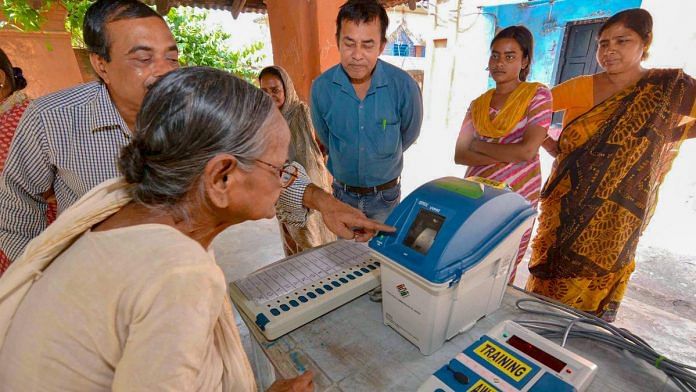New Delhi: The Supreme Court Monday favoured increasing the random physical verification of VVPAT slips in the upcoming Lok Sabha and assembly polls and told the EC that “no institution should insulate itself from improvement, including the judiciary”.
It was not the question of “casting aspersions”, rather a matter of “satisfaction” of the electorate, the top court said.
It asked the EC to file response as to whether it can increase the number of sample surveys of VVPAT slips from one in each assembly segment for the upcoming general and assembly elections.
The court was hearing a plea filed by 21 opposition leaders, led by Andhra Pradesh Chief Minister N Chandrababu Naidu, seeking that VVPAT slips of at least 50 per cent of voting machines in each assembly constituency be checked randomly in the Lok Sabha elections next month.
A bench of Chief Justice Ranjan Gogoi and Justice Deepak Gupta asked the EC to file its reply on affidavit indicating the reasons of its satisfaction that purity of elections can be maintained and is being maintained.
“The Election Commission of India (EC) is fully satisfied that the purity of the elections can be maintained and is being maintained. The Election Commission of India shall indicate the above in an affidavit the basis of satisfaction,” the bench said.
It further said, “The Election Commission of India shall also indicate that if the sample survey can be extended to a higher level…the affidavit shall be filed by 4PM on March 28. The matter is listed for further hearing on April 1.”
At the outset, the bench told the deputy election commissioner Sudeep Jain, appearing in person, whether the poll panel can increase the number of random physical verification of VVPAT slips with EVMs from the existing stipulation of only one polling station per assembly segment.
Jain replied that the ECI has adequate reasons to believe that there was no requirement for changing the present arrangement of random matching of VVPAT slips with Electronic Voting Machine (EVM) for one polling per assembly segment.
To this the bench said, “It is not the question of casting aspersions rather it is question of satisfaction. Two is better than one. Tell us, can you do a little more. We would like to increase it. Can you increase it? If you are willing to do it on your own do it but if not then give the reasons.”
Jain replied that the present arrangement of counting of VVPAT slips in one polling booth per assembly constituency in assembly polls and in one polling booth in each assembly segment for Lok Sabha polls has worked well but the poll panel is open to suggestions.
The bench was seemingly dissatisfied with the persistent response of the EC official that the present system has been working well and asked the poll panel to file an affidavit detailing the reasons of its satisfaction that there was no need for any improvement.
“If the present system was working well then why did you not start using VVPAT on your own. Why did you need court orders for that (earlier). Why did the judges have to think about it. Why did you oppose the court’s suggestion at that time. You had opposed at that time but yet we did it,” the bench said.
It further said, “No institution shall insulate itself from improvement, including judiciary. There is always a scope for improvement. Everyone needs improvement”.
The bench had on March 15, issued notice to ECI and asked the competent authority to depute an officer to assist the court in the matter.
The leaders from six national and 15 regional parties, claiming to represent 70-75 per cent of the population, have also sought the setting aside of the EC guideline on random verification of one assembly seat.
The parties include the Congress, Nationalist Congress Party, Aam Aadmi Party, CPI (Marxist), CPI, Trinamool Congress, Samajwadi Party, Bahujan Samaj Party, Rashtriya Lok Dal, Loktantrik Janata Dal and the Dravida Munnetra Kazhagam (DMK).
The plea had referred to the 1975 verdict of the apex court in the case of former Prime Minister Indira Gandhi which held that free and fair elections are part of the basic structure of the Constitution of India.
It had also referred to the 2013 verdict of apex court in the case of BJP leader Subramanian Swamy where it was held that paper trail for EVMs are an “indispensable requirement” for free and fair elections.
The plea had further stated that the directions are being sought for giving effect to the judgment of this court declaring VVPAT as “integral and intrinsic to free and fair elections which, in turn are part of the basic structure of the Constitution of India”.
The parties had raised apprehensions in a meeting with the EC in February about the credibility of EVMs, although the poll panel has denied allegations of machines being tampered with.
The EC, while announcing the Lok Sabha election schedule, had said that mandatory checking of EVMs and VVPAT will be done on the basis of one polling station for each Lok Sabha constituency.
Also read: Statistical body says opposition demand for 50% VVPAT verification not ‘sound’




it’s interesting that EC has so much confidence on the EVMs.. But then what about about hacks on prominent private companies like Yahoo, FB, Visa, etc or even US govt agencies, all of which invest heavily in digital security, but still face continuous threats?
If indeed we have such foolproof anti hacking technology, we should patent this and immediately start advertising this competence for the global market. At last Make in India and Digital India will succeed.
A minimum of 10% physical counting of these slips should take place. The VVPAT machines are not decorative flower pots, one booth per constituency.